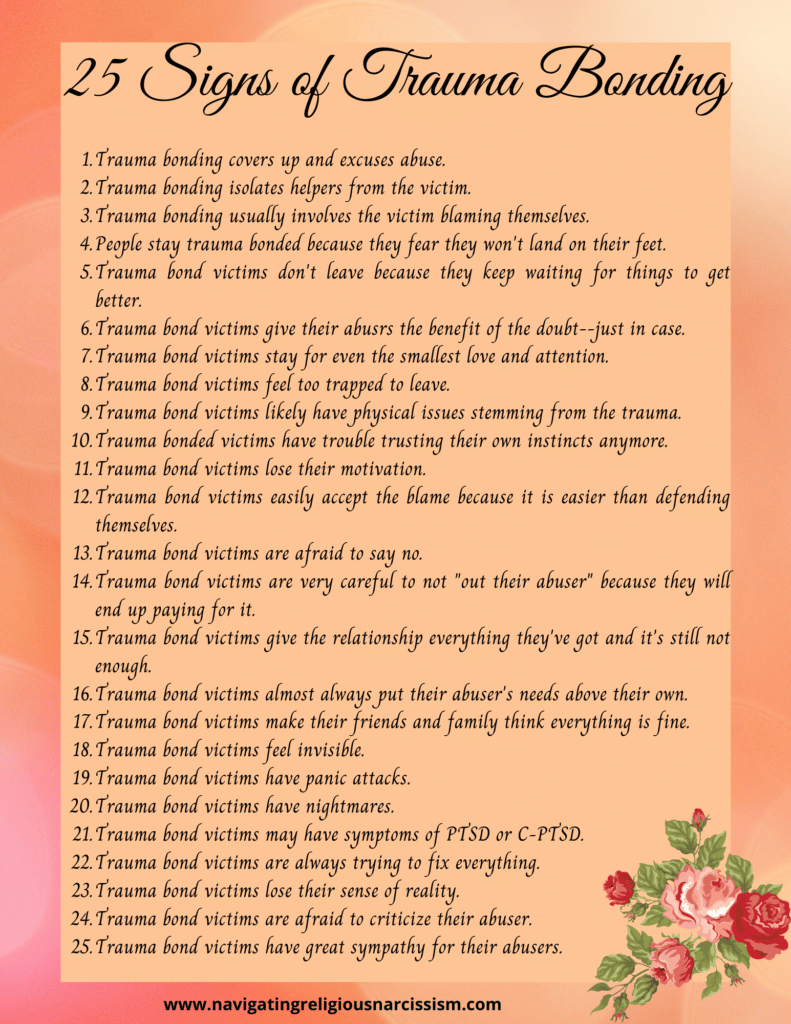Reviewed by Karis A. Williams, MSMHC, LPC,
Trauma bonding has become quite the buzz word recently. Simply, what it refers to is someone who is deeply emotionally bonded to their abuser because rather than seeing just the abuse, they see humanity, comfort, protection, and good in them. And then they latch on to the abuser and continue in relationship to them because they see value in the relationship. This is certainly not a healthy place to be. You will need to look out for trauma bonding signs for the sake of your own wellbeing.
As a general rule, there are actually myriad trauma bonding signs to look out for. A few major examples are covering up or excusing the abuse, isolating from people trying to help them see the trauma, blaming oneself for the abuse, and walking on eggshells to keep the abuser calm and unbothered. Recognizing these signs alone will get you a good way along the path to healing. Let’s go ahead and take a deeper look at them as well as many others.

Table of Contents
Trauma Bonding Covers Up and Excuses Abuse
It is amazing to see what lengths victims of trauma bonding will go to so they can cover up the abuse. Here are some of the most commonly used excuses:
- It’s not his fault, he had a traumatic childhood.
- It’s my fault he reacted that way. I need to be better.
- He just misunderstood. I need to learn to explain it better.
- Maybe I’m the one that misunderstood. I should pay better attention.
- He’s tired. It’s been a long day.
- I’m not perfect. Why should I expect perfection from him?
- It doesn’t seem as bad as other forms of abuse. Maybe I am making too big of a deal about it.
- He’s so nice when he _____. The good probably outweighs the bad.
There are plenty more excuses where those came from, but this will certainly get you on the right track.
I will admit that I used every single one of these at one point or another in the 35-year relationship with my narcissistic ex-husband. I would go to any length to excuse his behavior and avoid rocking the boat. If I could succeed at that, he would be happy. And I wouldn’t be paying any consequences for setting him off. On the days that I didn’t extend him unlimited grace, he definitely made me feel it. And that is why making excuses became such an easy and automatic thing to do.
*Note: For the best resources on understanding, dealing with, and healing trauma bonds, click here!
Trauma Bonding Isolates Helpers From the Victim
This trauma bonding sign usually disguises itself as protection and care. If nothing else, our narcissists absolutely know how to put the right spin on their abuse.
I had no idea the isolation that was happening. That is because he would isolate those around me and drive them away. They would feel like they were the only ones being treated that way. Or that maybe they had misunderstood. Because of their confusion, they wouldn’t tell anybody about their experiences with the narcissist.
In my case, my ex-husband would wait for my friends and family members to be in a part of the house alone. Then he would go in there and quietly seethe, almost hiss, in their faces something to the effect of, “If you ever say that to my wife again…” It was enough for them to back away silently and not return. And I had no idea for 30 years that it had been going on from the beginning.
When did I finally start finding out? When I started telling people we were separated. All of a sudden, almost everyone said they had had some isolating and unnerving experience with him and they could totally believe the experiences I had lived behind closed doors.
How I wished we had all realized sooner and not let the isolation cloud our judgment.
Trauma Bonding Usually Involves the Victim Blaming Themselves
At first, this trauma bonding sign seemed more like a joke. It actually started with my father-in-law joking that I so easily took all the blame. So then I just did. And the more I did, the more the whole family realized they could take advantage of that.
Over time, I just learned to blame myself. I used all of the excuses mentioned above. And I always swore to myself that I would be better, more perceptive, wiser, kinder, more loving, more of whatever I needed to do to smooth things over. It always worked for at least a little bit. Until it just didn’t work anymore.
By the end of the relationship, I was tired of being the scapegoat for everything. I was tired of working so hard and never progressing to a better relationship. I was just plain exhausted. And I finally dedided that I was not playing that game anymore. It wasn’t always my fault. And I was no longer taking the blame just for the sake of making life easier.
People Stay Trauma Bonded Because They Fear They Won’t Land on Their Feet
I doubt there are many victims of trauma bonding that escape this sign. We become so entrenched in the “protection” of our abusers that we don’t realize we are strong enough to land on our feet, or even get out of the house for that matter. The longer we are in this situation, the harder it seems to break free.
In my case, my marriage was ending just as I was turning 50. I only had 3/4 of my bachelor’s degree. Even if I did finish it, nobody would hire someone who spent 30 years at home taking care of the kids, homeschooling, and in children’s ministry. I was a master homemaker, which unfortunately the world considers qualified for nothing else.
I knew if I got a job, it would be for so little pay I wouldn’t be able to make ends meet with the kids at home. I did work nearly 14 hours a day as a server for almost a year when we first separated. And I never saw my kids. I would let them stay up until 1 am, when I would roll through the door. Then we could spend at least a little bit of time before I got up the next morning and started again. Homeschool fell apart. And at the end of the year, I couldn’t do it another day.
God showed me that He is bigger than these issues. And little by little, I am finding my sea legs. I am happy with where things have ended up, but even more so with the direction they are going. And I am so incredibly grateful for the many people who celebrated my strength, allowing me to put myself out there and believe I could do it after losing all faith in my abilities.

Trauma Bond Victims Don’t Leave Because They Keep Waiting for Things to Get Better
This trauma bonding sign is the second component to the last point. I felt like even if I could get on my feet and figure out how to make life work in unconventional ways, I didn’t want to leave the life that I had worked on for nearly 35 years. I grieved that I would no longer have the companionship into my elderly years, something I had always looked forward to. And I thought maybe there were enough good times to make that work. Until it just got to the point that I knew I couldn’t live for just those few good times. As time went on, they became so scarce that I could see them eventually disappearing.
I do remember thinking almost daily that if I could just love him in a more obvious way to him, surely he would reciprocate the love and we could finally have a wonderful marriage. I even thought that when he dragged me to counseling to force me to blindly obey his every whim. That day he actually told me that if they found things wrong with him, he would fix them and he expected me to do the same. He did not actually do that because when the counselors started to speak truth into them, he denied that anything could possibly be wrong with him.
And with that, I realized things would never be better.
Trauma Bond Victims Give Their Abusers the Benefit of the Doubt–Just in Case
Because of how things would escalate if I was not always agreeable, I tended to make sure I gave lots of benefit of the doubt. Even when there was none to be had. First, I would go through all the reasons that I was wrong and not seeing things right. Then I would rationalize it that maybe there was a good reason that I had missed. So in the end, I just needed to give him the benefit of the doubt because there would still be the tiniest doubt in my mind that maybe I was wrong and he was right.
Unfortunately, he knew very well that he could plant a seed of doubt with just a hint or look. He rarely even had to say anthing. And over time, I think he probably didn’t even have to give me the hint or look. Because my own trust in myself was so eroded I didn’t have the confidence to believe I could ever be 100% sure.
Trauma Bond Victims Stay for Even the Smallest Love and Attention
This trauma bonding sign is significant because it plays into the reality of every marriage. Nobody has a perfect marriage. Nobody is perfect. And when we start expecting perfection, things go downhill very quickly.
So where do you draw the line between expecting perfection and realizing that things are not ever going to be as good as they should be? Waiting a lifetime to realize that things are never going to be what they should no matter how much grace or love you extend is devastating. And nobody should have to live that life.
I realized my situation about 15 years into the marriage. But as a devout Christian, I did not believe in divorce for a difficult marriage. I also didn’t see my marriage as abusive at the time because I had never been in a healthy relationship. So I lived for those few bones of love and attention that were thrown at me. Because that’s all I thought I could have.
It wasn’t until I was “forced” into counseling that I started to realize the depth of abuse I was experiencing and that I didn’t have to stay trapped because I did have Biblical reasons for divorce. My counselor came to call my introduction to counseling the “best worst day of my life.” I treasure the healing she provided me to this day.

Trauma Bond Victims Feel too Trapped to Leave
Another trauma bonding sign that I experienced was feeling like I could not branch out on my own, even with Biblical reasons to separate and divorce. I had spent my whole adult life with my husband. Actually, I had never been on my own, except for college, which wasn’t really on my own. I didn’t know how to switch gears, especially with 5 of my still-minor children in tow. There was just too much at stake and I felt like if I was going to do this, it was going to have to be flawless. And that’s when my counselor started talking about grace.
Because I had lived life under such a microscope, I did not realize that less than perfect life was okay. That took a long time for me to work through. And the funny thing is, once the kids and I began our new life, it felt a lot closer to right/perfect than the life I had strived to live perfectly up until then. (Just to clarify, it was not totally right. And it was far from perfect. But it was finally a life of peace without walking on eggshells.) We were no longer living in fear.
Trauma Bond Victims Likely Have Physical Issues Stemming from the Trauma
It is a well-known fact that mental health issues affect physical health. And this trauma bonding sign is probably one of the most significant because of the impact it has on the victim. Here are just some of the ways trauma bonding can affect you physically:
- Weight gain or loss
- Sleeping too much or not enough
- Blood pressure issues
- Hair loss
- Headaches
- Stomach issues
- Brain fog
- Loss of energy
- Lowered immunity
- Panic attacks
All of these are issues that should not be ignored. Adding to the severity, most trauma bonded victims experience multiple physical affects. If you are experiencing any of these signs, see a doctor as soon as possible.
To help you further understand how much trauma affects one physically, the book, The Body Keeps the Score, does an amazing job of explaining. It is the best book I have read on the subject and is recommended in every circle of support I have ever been involved with. Please check it out!
Trauma Bonded Victims Have Trouble Trusting Their Own Instincts
If you are not familiar with the word gaslighting, now is the time. Gaslighting is psychologically manipulating someone into thinking they are incapable of perceiving things correctly or that they are even outright crazy. The more trauma bonded victims are subjected to this kind of psychological abuse, the harder it is for them to realize that the problem is not them or their thinking.
The further down the road they go in this manner, the cloudier their thinking actually becomes. Over time, many victims of gaslighting actually come to believe that they are mentally ill. It becomes a self-fulfilling prophecy.
This is so incredibly unfortunate. But research shows that with good counseling victims can actually come out of the fog remarkably well and even quickly. Once the victim starts to see reality for what it is, healing begins immediately. And even better, the clearer thinking will snowball.
There is actually one more benefit to healing from this aspect of trauma bonding. Once a victim has seen reality, they won’t be able to unsee it. Not only will they be able to see their troubled relationship in healthy ways and be able to move forward, they will see what constitutes emotional health in all of their relationships going forward.
Trauma Bond Victims Lose Their Motivation
It is very difficult to have motivation when you feel like you are constantly on the downside, fighting your way back up. The more you feel defeated, the more you don’t feel like pulling yourself back up again.
Trauma bonded victims are generally worn down over a very long time, often without realizing what has been happening the whole time. They just know they are tired and can’t ever seem to catch a break. And with that spirit, motivation is very hard to find and embrace.
Trauma bonding signs can go hand-in-hand with symptoms of depression. Finding motivation through depression can seem like an insurmountable task. According to Choosing Therapy, the first line of defense when self care isn’t enough is cognitive behavioral therapy.
If self care methods, such as getting good sleep, eating well, getting support from friends and family, and establishing good routines are not working for you, it is likely a good time to find a counselor. You will need to confirm any potential counselors have experience in dealing with trauma bonding and other abuse issues.

Trauma Bond Victims Easily Accept the Blame Because it is Easier Than Defending Themselves
This trauma bonding sign is almost universally used by victims because the price they will pay for taking the blame up front will be much less severe than trying to hold their ground and make their truth known. I did this for years because a 5-minute tongue-lashing was much easier to take than the screaming match that would ensue if I dared to argue with his perceptions. If I chose to argue my point further, often he would make a point of letting me know that “there was something really wrong” with me and I needed to get professional help. All because I chose to defend myself when I knew I wasn’t wrong.
I learned that it didn’t matter to be right if I could keep things from escalating. I remember thinking to myself that as long as I knew I was right, it really didn’t matter what he thought. As long as I had some peace by proclaiming his “rightness” no matter how wrong he was.
It is definitely a sign of trauma bonding that truly does make life bearable in the middle of the chaos.
Trauma Bond Victims are Afraid to Say No
This trauma bonding sign is an extension of the last one in that it allows the abuse victim to stay under the radar. I knew I was almost always over my head. I spent the majority of my married life homemaking, homeschooling, and in children’s and women’s ministries. There was never a day that everything got done. But I did what I could. And for the most part, I didn’t mind. I did enjoy those aspects of my life.
Unfortunately, as part of my ex-husband’s narcissism, not only did he have to be perceived as perfect, he needed his whole family to be perceived as flawless as well. And that included me being involved in everything at church and looking like the “perfect Christian mom and wife.”
To reiterate, I did love my everyday life. And I loved being in ministry. But I was exhausted. And I was usually way over my head.
I do remember people asking me how I did it all. Generally speaking, I was actually very candid. I told them I never got everything done, but just what was most needed at the time. And I rarely slept. Most people were grateful for my honesty. And I would like to think they were also comforted that they didn’t have to try to do the impossible every day, but just what they could do if they worked to the best of their ability.
I Learned to Say No
I still do tons of ministry because that is where my heart is. And I am still plugging away at homemaking along with my new career of creating and running websites. Admittedly, I am still over my head in daily activities. But I am also much better at saying no. Even more, I am better at not signing up for things that I don’t really have the heart for because someone is expecting me to. I will always be super busy. But I don’t mind if I am doing the things that are good for the life I am living now!
Trauma Bond Victims are Very Careful to Not “Out Their Abuser” Because They Will End up Paying for It
Trauma bonding victims are generally aware that things aren’t quite right. They may even know specific things that are actually wrong and be able to articulate them. But this trauma bonding sign is yet another way that victims can protect themselves from further harm. Especially in relationship with narcissists, trauma bonded victims put up with daily abuse and gaslighting. But if they call out their abuser, there will be hell to pay. Narcissists can’t stand to be exposed. And they will make your life miserable if you try.
I remember thinking that maybe the abuse wasn’t so bad. It certainly wasn’t the worst anyone had experienced. And that is what made me willing to put up with the daily chaos. I didn’t want to paint my husband in a negative light. Most wives WANT to support and love their husbands, especially publicly. And there were good things that he did. So I spent most of my time concentrating on those things.
I Had to See it For What it Was to Fix It
Because gaslighting was a daily part of life, I wasn’t even sure about the abuse until I had been in counseling for some time. It was then that all the pieces came together. By that time, I had a very large amount of support from church, counselors, neighbors, and friends, among others. So when the time came that our separation and divorce became public, I didn’t have to worry so much about “outing” my ex. And as we got further into the process, he ended up outing himself with his lack of control and crazy downward spiral.
If you do not have a good network of support set up yet, it is critical that you do before you try to call out an abusive partner. Find two or three people you know you can trust that can help you start walking this road. If you feel you are not safe, call the proper authorities. Or call the National Domestic Abuse Hotline at 800-799-7233 or visit them online.
Trauma Bond Victims Give the Relationship Everything They’ve Got and it’s Still Not Good Enough
One of the hallmark signs of trauma bonding is when a victim pours everything they have into the relationship and daily realize it is not enough. The harm this does to a person’s emotional health is devastating. After years of this, a trauma bonded victim may feel as though even if they were perfect it would not be enough. And with that devastating realization, they just give up.
It took me about 20 years of trying my hardest most of the time (I did things wrong too–I certainly wasn’t perfect) before I finally realized things were not going to get better. If he could not see me trying my hardest in the relationship and reciprocating, there really wasn’t much reason for me to keep trying so hard.
It was at this point that I told him I would still be his wife, but my life would not revolve around him anymore. Honestly, it should have anyway. I was finally coming to terms with my codependency. I just didn’t realize that was what it was yet.
He was angry that I was no longer making him the center of my world. And he begged and pleaded for me to go back to that place. And then he started turning me in to church leaders and our new counselor to make me fall in line. This was the best thing that could have happened to me. People outside of the household were now seeing what was going on behind closed doors. And this was the beginning of me finally getting on my feet.

Trauma Bond Victims Almost Always Put Their Abuser’s Needs Above Their Own
I didn’t even realize that this trauma bonding sign was a problem. I had always been a giving person. And I always dove in 100%. So trying to put my ex-husband’s needs above my own wasn’t a problem. Part of this was the codependency speaking. And part of it was just that I enjoy giving of my time and resources to others.
The real problem is when a trauma bonded victim puts ALL of their abuser’s needs above their own. Giving is a good thing. And taking care of yourself is also a good thing. Finding the balance is probably a lifetime struggle for those who deal with codepency issues. But once a codependent person starts to find that balance, the strength they gain instantly is amazing.
On the flip side, once the trauma bond victim starts to put their own needs first, there will be hell to pay. If you are in this situation and starting to assert your own needs as a person in the relationship, make sure you are safe! Surround yourself with support so you can do the things you need to do to get yourself on your feet. And, once again, if you feel like you are in physical danger, call the National Domestic Abuse Hotline at 800-799-7233 or visit them online.
Trauma Bond Victims Make Their Friends and Family Think Everything is Fine
This trauma bonding sign is a major construct that allows the abuser to keep the victim under their thumb. Trauma bonding victims feel that things are not what they should be. And when their abusers tell them everything is fine, they take a strange comfort in those words because they want everything to be fine.
But on the other hand, they still know deep down that something is wrong. And often, when they do try to talk to their abuser about it, the abuser responds in a way that will shut them down instantly.
When I would say something was wrong, my ex would immediately raise his voice to me and tell me everything is fine and I had no right to question things. His immediate anger would nearly always cause my immediate silence. Because I didn’t want to rock the boat. This went on for many years. I finally responded to his attempt to shut me down by telling him I knew that was what he was doing. It almost always resulted in a heated argument. But for once, I was standing up. And the more I did it, the better I started to become at stating my feelings and learning how to navigate conflict in a healthy way with a narcissist.
Trauma Bond Victims Feel Invisible
I think this trauma bonding point may actually be a place of comfort for most victims. For sure, I didn’t like being invisible to my ex–sometimes. I wanted him to see me and appreciate me. But I also didn’t want to be intently stared through with piercing eyes. Or focused so much on that I couldn’t escape his over-zealous scrutiny.
The good part of feeling invisible is that you can hide much of your insecurity. I think I liked that because it was just a product of my “introverted-ness.” Honestly, I have no idea even know if my introverted nature is due to genetics or upbringing. I think it is probably both. But I know that I like being invisible more than being in the spotlight.
The bad part of feeling invisible is that I felt like I was unloved and unlovable. While I didn’t want to be in the spotlight, I did want to be appreciated and care for on a personal level. And this is something that trauma bond victims don’t get very much of. But when they get any at all, they are grateful and find it bonding them even more to their abuser. This is a hard process to work through in a healthy way.
Trauma Bond Victims Have Panic Attacks
The next few trauma bonding signs actually start delving into the PTSD realm. Panic attacks is the sign that your body is no longer okay with what is going on psychologically.
Panic attacks can take several different forms. It can start with a feeling of foreboding. And then it gets progressively worse from there, including feeling like you’re having a heart attack. I know of several people who went to the emergency room thinking they were having a heart attack, only to be told it was stress/a panic attack.
According to Mayo Clinic, here are some of the more prominent signs of panic attacks:
- Sense of impending doom or danger
- Fear of loss of control or death
- Rapid, pounding heart rate
- Sweating
- Trembling or shaking
- Shortness of breath or tightness in your throat
- Chills
- Hot flashes
- Nausea
- Abdominal cramping
- Chest pain
- Headache
- Dizziness, lightheadedness or faintness
- Numbness or tingling sensation
- Feeling of unreality or detachment
If you have several of these in conjunction, it is especially important that you speak with your counselor and/or doctor as soon as possible.
Trauma Bond Victims Can Have Nightmares
Nightmares are actually quite common following most types of trauma. So nightmares being a trauma bonding sign is well within the realm of normal, although definitely not welcome.
Dreaming is one way our brains work through trauma. So while it may be scary or odd, once you realize that dreams are an extension of what is going on in your life, it becomes easier to manage the insecurities surrounding them.
It could be helpful to write them down as you first wake up. Often, once you are awake and your day has started, it is impossible to quite remember the dreams you had or important details.
Upon writing down several of your dreams, you will start to see some patterns emerge if you hadn’t already. And it would be a good thing to share with your counselor, allowing them to help you process what is happening in your mind while you are sleeping.

My Experience With Trauma Dreams
I had a recurring dream that started in late 2001 or early 2002. I kept dreaming that a family member had passed away in my care. It was usually one of my smaller children, but could even be my husband at the time. It happened several times a week. And I usually woke up my husband with my panic over the child/person not breathing. If I had a child with me in bed, it was usually a dream about them. And in a half-awake state, I would touch their face or arm. They usually felt cold to my touch, which would make me even more panicked. And then I would wake up my husband and try to get him to help me because I couldn’t figure out what to do. There were also times I would wake him up because I thought he was no longer breathing and had passed away.
I always chalked these dreams up to having a large number of kids and a subconscious realization that I could protect them every second of the day or night. But very interestingly, I actually stopped having these dreams in April of 2018, literally the same time that my ex-husband was removed from the home by our church and counseling agency. I had no idea that the dreams were attached to so many years of walking on eggshells.
Trauma Bond Victims May Have Symptoms of PTSD or C-PTSD
This trauma bonding sign is especially prominent if the victim has been suffering under the control of their abuser for a long time. PTSD or C-PTSD are both ways that the body handles trauma that it is unable to work through, for whatever reason. The most often people tend to hear about it is in relation to someone experiencing the atrocities of war. But domestic violence is also a signficant source of C-PTSD.
The problem is that many don’t realize they are suffering from it because they are unsure about the abuse they are experiencing. Because trauma bonded people are usually psychologically abused instead of physically, they are not as clear about the nature of the abuse. And that can cause them to continue living in abuse because they don’t understand the signficance of what is happening to them.
Specific Symptoms of PTSD and C-PTSD from Narcissistic Abuse
Here are some of the symptoms of PTSD and C-PTSD from narcissistic abuse:
- Events, smells, sounds, tastes that trigger you to have a panic attack or extreme anxiety
- Nightmares in which you feel powerless and in danger
- Larger than normal reactions to something you have experienced–could be good or bad
- Extreme awareness of what is going on around you coupled with concern that you don’t want to rock the boat
- Little to no self-worth
- Isolation due to fear of things in life that should be normal
- Fear of the future
- Inability to trust new relationships in the future
Whether you have symptoms this severe or just on or two of them in isolation, it is important to understand the effect narcissism has on psychological health and make the necessary adjustments to get back to an emotionally healthy life. Seeing a counselor experienced in narcissistic behaviors is a great first step. I was lucky to get the best counselor when things started going downhill. She figured out the narcissism part pretty quickly and healing started immediately after that. If you are seeking out a counselor, make sure they are experienced in narcissistic personality disorder. This will get you on the road to healing so much more quickly.
Trauma Bond Victims are Always Trying to Fix Everything
With this trauma bonding sign, victims learn early on that the sooner they can “make things right” the sooner their abuser will back down from the chaos. Victims know if they can diffuse a situation before it escalates too much, they will have much less to deal with on the other end of it. Even more so, they learn that if they can solve the problem before their abuser even realizes they are about to explode they can avoid all the chaos.
That fact that trauma bond victims can often see how and when their abuser is about to spiral out of control shows the pattern most abusers fall into. Unfortunately, without counseling and other healing methods, victims often aren’t consciously able to see and function through the episodes.
I was able to head off many things that happened or at least get myself and my kids where we needed to be before things escalated all the way. But there were many things that happened that were totally unpredictable to us at the time. After a year of counseling, though, I started being able to see the patterns of behavior more clearly. And my counselor showed me healthier ways to work through the episodes when they caught me off guard. It was life changing for me because for the first time in my life, I realized I didn’t have to let people control me in inappropriate ways.
One of the biggest things I learned was that it wasn’t up to me to fix things so people wouldn’t take it out on me. I can only control my own actions. Further, I don’t need to let others control me for the sake of keeping peace and avoiding anger or “punishment” for not falling in line with others’ demands.
Trauma Bond Victims Lose Their Sense of Reality
This trauma bonding sign can mostly be a result of constant gaslighting that makes the victim feel detached from reality. Even victims that have a great head on their shoulders can be susceptible to this. Because gaslighting is a slow, gradual process at chipping away at someone’s reality, it can be very effective in destroying someone’s ability to see things as they are, even when that person is intelligent and wise.
This is what makes gaslighting so insidious. The victim wants to give the gaslighter the benefit of the doubt, often because the gaslighter uses kind words or expressions to do the psychological damage. Most people are conscientious in calling people when things don’t seem right. They don’t want to be wrong about judging others’ motives. So they give the benefit of the doubt to the narcissist’s lies. And that gives the narcissist the green light to continue the gaslighting based on the grace extended to them from their victim. This cycle continues until the victim’s ability to discern has been destroyed.
At this point, the victim often doesn’t see what has happened to them psychologically. And they come to depend on the narcissist’s judgment, thinking that they are looking out from them. But what they are doing in reality is the polar opposite. Until the victim gets out from under the influence of their abuser, it can be very hard for them to see reality.
Trauma Bond Victims are Afraid to Criticize Their Abuser
This trauma bonding sign is pretty obvious in its methodology. The abuser can’t be questioned. He will not tolerate being wrong about anything. When accused of wrongdoing, they will get angry very quickly. If the trauma bonded victim holds their ground and continues to hold their feet to the fire, the anger will escalate even further. It doesn’t take many of these episodes before the trauma bonded victim stays silent rather than calling out what is right.
From here, the victim will start exhibiting several other trauma bonding signs, such as excusing the abuser’s behavior, losing their motivation to make things work, accepting the blam because it’s easier, fearing saying no, not willing to “out” their abuser, putting their abuser’s needs and wants above their own, hiding what is going on from friends and family, and more.
The point here is that the abuser learns which buttons to push to get what they want and the victim learns how to avoid drawing negative attention from the abuser. It turns into a very unhealthy dance that each partner thinks they are functioning the way they need to. And that is why counseling with someone who has experience in narcissism, codependency, and trauma bonding is critical to your emotional health.
Trauma Bond Victims Want to Have Sympathy for Their Abusers
As a general rule, trauma bonding victims tend to extend a great amount of grace to others. If they know anything, they know how it feels to be accused wrongfully. And they don’t want to make anyone else feel that way because of something they did or said.
This trauma bonding point is what victims use to guarantee they won’t make the mistake of being unsympathetic to others, regardless of how they have been treated. They won’t be unsympathetic to those who have wronged them, because they hope that their abuser will see their kindness and reciprocate. Or they don’t want to be seen as seeking revenge.
And they generally extend sympathy to everyone they meet because as codependents they want to make everything better for everyone. This is not a bad thing unless they are extending sympathy to everyonen else at their own expense more often than not.

Conclusion
While this is a large list of trauma bonding signs that victims experience, it is not an exhaustive list. But it will give you a good idea of what a victim goes through when trying to smooth over their relationship with their abuser.
Many people find themselves in relationships of this nature, some less damaging and others more damaging. If you are in an unhealthy relationship with another person, the relationship, it is important to look into some good resources to help you make some healthy transitions. But if the relationship is not repairable based on doing the healthy things you need to, then for your own sake you need to speak with a counselor and a few trusted friends to get yourself back on the right track. It is never worth it to lose yourself in order to save a relationship.
Note: If you feel like you are in immediate physical danger, call the National Domestic Abuse Hotline at 800-799-7233 or visit them online.
If you liked this article, I think you will also love the following articles:
What to do When Your Narcissist Threatens You
The Bible Used as a Weapon Against You: You can Overcome!
What Does the Bible say About Abusive Husbands?
The Link Between Spiritual Abuse and Narcissism
What Does the Bible Say About Abusive Husbands?
The Link Between Spiritual Abuse and Narcissism
Can a Narcissist Change for Love?
Why are You Attracting Narcissists?
Why Narcissists Love Going to Church
Does a Narcissist Know They are a Narcissist?
How Religious Narcissists Think?
Can a Narcissist be a Good Person?
Narcissistic Behavior: What to Look Out For
Praying for Your Narcissistic Husband
Are Spiritual Narcissists Overt or Covert?
How to Navigate Religious Narcissistic Parents
What Happens to the Soul of a Narcissist?
How to Heal From a Spiritual Narcissist
Can You Maintain a Relationship With a Spiritual Narcissist?
Can Narcissists Have a Spiritual Awakening?
How Will God Judge a Narcissist?
When the Church Says to Move Back in With Your Narcissist
What Can We Say to a Friend Who’s Divorcing
23 Reasons Why Narcissists are Drawn to the Church
When the Church Doesn’t Recognize Narcissistic Abuse
Will the Church Support Divorcing a Narcissist?
What Does the Bible Say About Narcissism?
Can a Spiritual Narcissist Heal?
Can a Narcissist Be a Christian?
What Does the Spiritual Narcissist Do When You Try to Leave?
- How to Choose the Best Attorney When Divorcing a Narcissist - March 23, 2024
- Why Won’t God Heal my Narcissist? - February 28, 2024
- How Narcissists Use Religion to Control and Manipulate You - December 26, 2023





